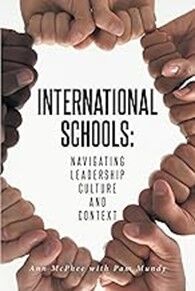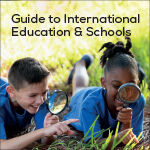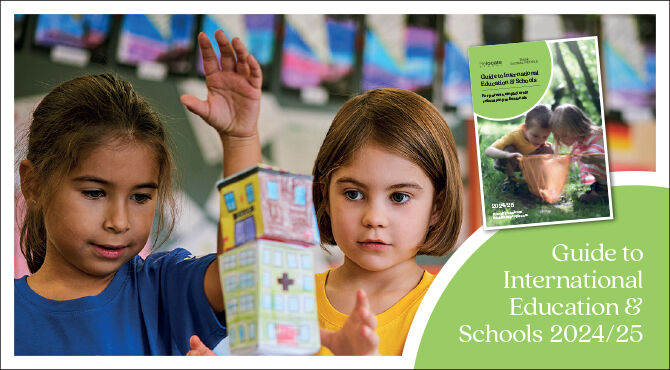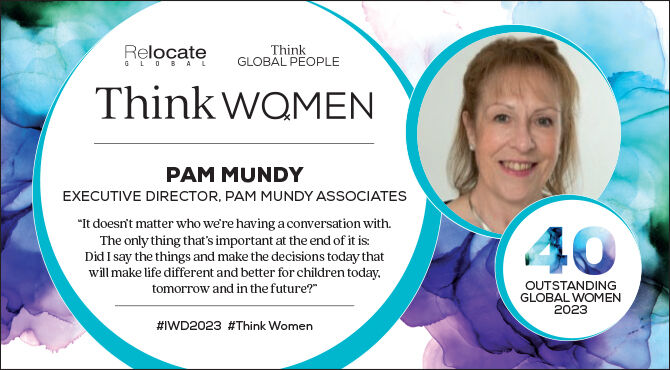Small world: early childhood education in an international setting
Early childhood education is increasingly valued and important. Specialist consultant Pam Mundy has worked in most countries around the world and advises on successful strategies to get it right. Sally Robinson reports.
This article is taken from the Autumn 2024 issue of
Think Global People magazine
Click on the cover to access the digital edition.Watching a video of a baby in a cot might not seem the most productive use of five minutes. Yet, it’s a technique early childhood consultant Pam Mundy sometimes uses to demonstrate exactly how crucial the early years are.Watch it once and her audience is shifting in their seats. However, a tutored second viewing shows just how much is going on. They start to see how the baby is exploring their environment. Even in the first few hours after birth, a baby can mirror the expressions of its parents.“Early childhood is the most challenging and specialist phase of education,” says Pam, who defines early childhood as being from minus nine months to eight years. “It is the most critical period in human development. It’s at the point where learning is fastest and where the blueprint of the brain is developed.”
Ensuring quality early years care and education
Early childhood has historically been seen as the poor relation to other phases of education. But the last few years have seen a global shift, with governments and schools scrambling to review and add early childhood to their provision, particularly in private international schools. Good early education and care that provide not just childcare, but also something much more, are crucial for working parents too.“There’s a growing realisation that if you get it wrong in early childhood, then you’ve got it very wrong for life,” says Pam. She therefore cautions investors, providers and practitioners against jumping on the early years bandwagon – they have to know what they are doing. So, what makes the difference?“The only place to start is with the child in mind and in your heart,” she says. Recruiting skilled practitioners is vital, as is the staff-to-child ratio, which can differ between regions. In the Middle East, for example, in addition to a teacher and teaching assistant, there will often be a nanny who is responsible for tasks like changing nappies and taking children to the bathroom.It's also about the quality of staff interaction with the babies and children in their care, including providing an appropriate level of stimulus and treating each child as an individual. “The child’s experience is only as good as the adult looking after them,” says Pam. “People think babies are all the same, yet in a high-quality nursery, the team will know each child as a total individual.” Babies and children will have their own bedding and comfort strategies. Staff will know exactly what they ate, drank and how they responded and progressed in their skills during the day, sharing this through high-quality dialogue with the parent or carer.Although Pam has worked with multiple and vastly different early childhood settings globally (from the US to the Kingdom of Saudi Arabia) where legislation and philosophies differ, she has a core of non-negotiables that never change.“It’s about understanding that babies are people,” she says, and about recognising early childhood is highly specialised and needs high-quality care. “That’s the framework against which I would hold any nursery or early childhood provision to account.”Read related articles
- Bright and early: the best start for young international learners
- What to consider when looking for an international school
- Outstanding early years education for international families webinar
What to look for in early years settings
Many new parents struggle to choose an early childhood setting, but watching how a facility works is key. “It’s all about the quality of the interactions,” says Pam – the interactions between staff and children, between different staff members, and with parents or carers at drop off and pick up.She asks parents to consider whether they can feel the presence and impact of the children in the setting and evidence of things they are involved in. Are they moving freely around the room? Is there a good balance of soft furnishings and space? Less plastic and more natural materials? Pam stresses the importance of open-ended resources that invite exploration and that access and promote the child’s imagination.Outdoor space is vital, either on-site or with regular provision for taking children to a park. So too is a clean, comfortable well-ventilated room for children to nap in with cots and personal bedding. A good early childhood setting should also provide high-quality food and make mealtimes part of the learning process. “It is about the quality of supported independence,” says Pam. “There’s a world of difference between plonking food on a four-year-old's tray and the interactive experience of a group of children sitting around the table with an adult and serving each other.”Sustainability is also important and effective if implemented in a way that is meaningful for small children. Early childhood facilities use a lot of nappies, bottles and baby wipes. All of those need to be as eco-friendly as possible. The same goes for food waste. “It’s about teaching the children and working on solving the problem together,” says Pam. The physical setting, she says, is less important. “It isn’t about the building; it is what you do with it. I have seen beautifully designed buildings that are exactly like a meringue: you poke a finger in them and there is nothing in the middle, no substance. Early childhood is a precious time that cannot be repeated and deserves the best we can offer.”

 Read Relocate Global's Guide to International Education & Schools 2022/23 which is packed with expert tips and information for those relocating and the professionals supporting them.
Read Relocate Global's Guide to International Education & Schools 2022/23 which is packed with expert tips and information for those relocating and the professionals supporting them.

Relocate Global's Guide to International Education & Schools 2024/25 coming soon!
Find out more about the Think Global People and Think Women community and events.


Subscribe to Relocate Extra, our monthly newsletter, to get all the latest international assignments and global mobility news.Relocate’s new Global Mobility Toolkit provides free information, practical advice and support for HR, global mobility managers and global teams operating overseas.
©2026 Re:locate magazine, published by Profile Locations, Spray Hill, Hastings Road, Lamberhurst, Kent TN3 8JB. All rights reserved. This publication (or any part thereof) may not be reproduced in any form without the prior written permission of Profile Locations. Profile Locations accepts no liability for the accuracy of the contents or any opinions expressed herein.

































